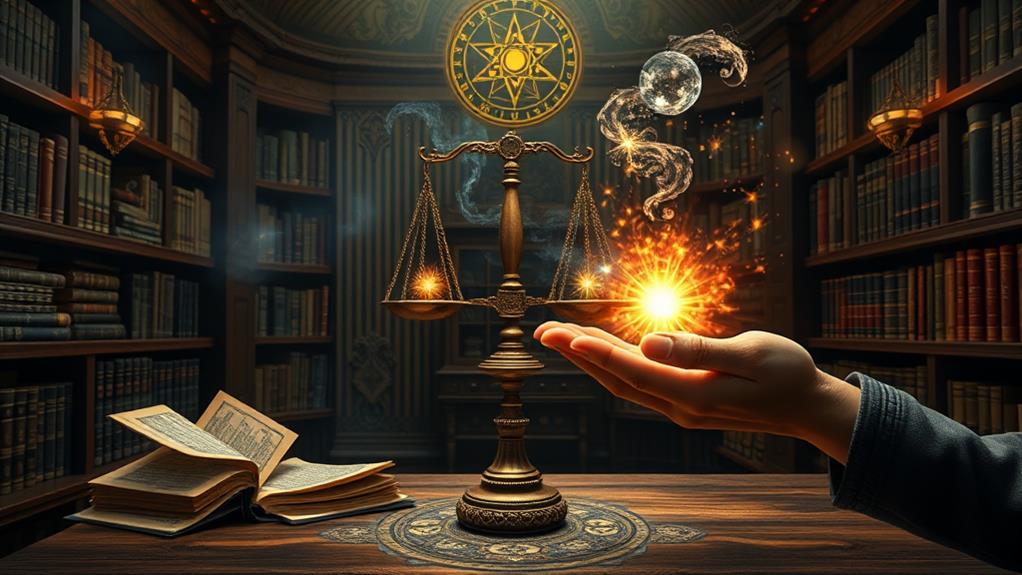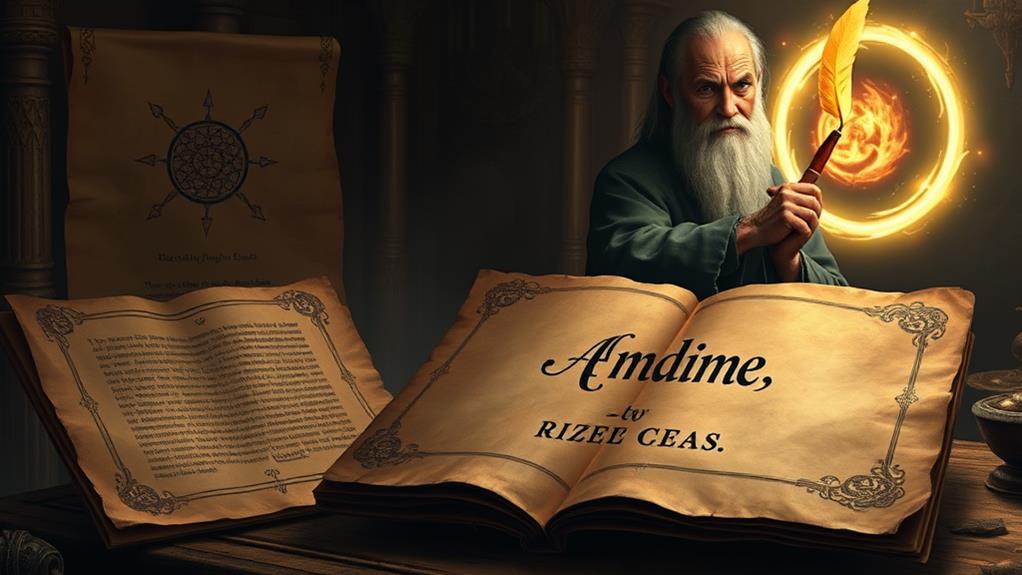
To master your magical craft, start with the five essential historical magical laws. The Law of Equivalent Exchange guarantees you get what you give, balancing every spell. The Law of Sympathy shows how interconnected the universe is, using like to affect like. The Law of Contagion emphasizes the lingering power of objects that were once connected. The Law of True Names grants power through the accurate naming of entities. Finally, the Law of Containment helps you control and focus magical energy. Grasping these principles will enhance your spellcasting profoundly. To explore these laws more deeply, let's investigate their origins and applications.
The Law of Equivalent Exchange

The Law of Equivalent Exchange is a cornerstone of magical practice, emphasizing that to obtain something of value, you must give something of equal value in return. This principle is essential for maintaining balance in your magical endeavors. When you conjure a spell or create a potion, you can't expect results without sacrificing something of equal worth. It's like a magical trade-off, guaranteeing you don't upset the natural order.
Imagine you want to craft a powerful amulet for protection. You'll need rare materials and perhaps a personal item imbued with your energy. These offerings guarantee the spell's success. Skimping on these could result in weak or even dangerous outcomes. The universe demands a fair exchange, and it's a rule you must respect.
In your magical studies, understanding this law will help you make wiser decisions. You'll think twice before attempting complex spells without proper resources. It also teaches you the value of what you seek to gain. By respecting the Law of Equivalent Exchange, you guarantee your magical practices are ethical and effective, maintaining harmony between your desires and the world's natural balance.
The Law of Containment
Picture a cauldron bubbling with a potent potion; that’s a perfect example to illustrate the Law of Containment. This fundamental law emphasizes the importance of boundaries in magic. By containing magical energy within specific confines, you guarantee its stability, effectiveness, and safety. Without proper containment, spells could spiral out of control or dissipate entirely. The Law of Containment not only protects the practitioner but also allows for the precise manipulation of magical energies. This principle is especially vital in modern contexts, such as when wizards merging magic with science seek to create innovative enchantments that yield predictable results. By establishing clear limits around their magical experiments, these wizards can harness the full potential of their craft while minimizing risks.
Here are three key points to remember about the Law of Containment:
- Define Clear Boundaries: Always use well-defined spaces like circles, cauldrons, or runes to hold your magic. This prevents it from leaking or scattering.
- Material Matters: The materials you use to contain magic are significant. For instance, certain metals and crystals can enhance or stabilize magical energies, while others might disrupt them.
- Intent and Focus: Your mental focus and intent act as an invisible container, directing the flow of magical energy. Without a clear purpose, your spells might not produce the desired outcomes.
Understanding and mastering the Law of Containment is vital for any wizard. It not only protects you and others but also guarantees your magical endeavors are successful and efficient. So, always prioritize containment in your magical practices.
The Law of True Names

Mastering the containment of magical energies sets the stage for understanding another essential principle: the Law of True Names. This ancient law suggests that knowing the true name of a person, creature, or object grants you significant power over it. In magical practices, true names aren't just labels but the essence of the entity itself. When you know something's true name, you tap into its core essence, gaining the ability to influence, summon, or control it with greater precision.
Imagine you encounter a mischievous spirit causing havoc. Simply calling it "spirit" won't help you much. But if you know its true name, "Azaroth," you can bind, banish, or command it effectively. True names are often hidden or guarded because revealing them can make one vulnerable to magical manipulation. Consequently, the quest to discover true names is both a powerful tool and a perilous journey.
In your studies, you'll find that ancient texts and wise mentors emphasize the importance of discretion and respect when dealing with true names. Misuse can lead to unintended consequences, including powerful retaliatory magic. Hence, wield this knowledge responsibly, ensuring you understand the gravity of invoking true names.
The Law of Sympathy
Many magical traditions hinge on the principle known as the Law of Sympathy. This law asserts that like affects like. When you understand this, you'll realize how interconnected the universe really is. Objects or beings that share a common trait can influence each other magically.
To leverage the Law of Sympathy in your magical practice, consider these key points:
- Similarity: If two items share similar characteristics, one can influence the other. For example, using a lion's claw in a courage spell works because of the shared trait of bravery.
- Representation: You can use symbols or effigies to represent something else. Crafting a small figure of a person and using it in spells is effective because the figure sympathetically represents the person.
- Association: Items associated with certain qualities or elements can transfer those qualities. A rose for love spells or a feather for flight spells are classic examples.
The Law of Contagion

The Law of Contagion posits that once two objects have been in contact, they continue to influence each other even after separation. This principle is pivotal in many magical practices. Imagine you've held a powerful artifact or worn a magical amulet. According to this law, a connection remains, allowing you to harness the object's energy or influence even when it's no longer in your possession.
To utilize this law, you might collect personal items like hair, nails, or clothing from someone you wish to affect magically. These items retain a connection to the person, making your spells more potent. For example, healing spells often employ a personal item from the patient to strengthen the connection and enhance the spell's efficacy.
In practical terms, when casting a spell, you'd place the personal item near your ritual tools to create a direct link. This guarantees that your magical intention reaches its target more effectively. Contagion isn't just about physical objects; emotional and psychological bonds can also act as conduits. Remember, the strength of the connection diminishes over time and distance, so act swiftly to maximize the law's potential.
Historical Context and Origins
Understanding the historical context and origins of magical laws like the Law of Contagion enriches your practice and deepens your appreciation for these ancient principles. This law, which states that objects or persons once in contact maintain a connection, has roots in various cultures and periods.
- Ancient Egypt: Egyptian priests believed that personal items retained a part of the owner's essence, using this belief in rituals to heal or curse.
- Classical Greece and Rome: Philosophers like Pythagoras and Pliny the Elder detailed practices where physical contact established a lasting bond, significant in their healing and divination methods.
- Medieval Europe: Alchemists and healers utilized the Law of Contagion, integrating it with the burgeoning field of sympathetic magic, where likeness and contact guided their spellwork.
Modern Implications and Relevance

In today's world, magical laws like the Law of Contagion aren't just relics of the past; they hold significant relevance in modern magical practices and even in psychological frameworks. You might not realize it, but the principle that objects once in contact continue to influence each other is echoed in modern concepts like emotional attachment and energy transfer.
Take the Law of Similarity, for example. It suggests that like affects like. In your daily life, you see this mirrored in homeopathy and even in the placebo effect. When you believe that a certain action or object will bring you luck, you're tapping into this ancient magical law.
The Law of Names remains essential, too. Knowing someone's true name gives you power over them. In today's digital age, personal data acts like a modern "true name." Guarding your privacy is akin to protecting your magical essence.
Even the Law of Correspondence, which states that macrocosm reflects microcosm, has relevance. Think about how your mental state affects your physical health; it's all interconnected.
At a Glance
As you explore these ancient magical laws, remember that even Merlin and Gandalf had to abide by them. These principles aren't just relics of the past; they're the foundation of all magical practice. By mastering the Law of Equivalent Exchange, Containment, True Names, Sympathy, and Contagion, you're not just learning history—you're harnessing the power that shaped legends. So, don't just read about magic; live it, and let these laws guide your journey.






